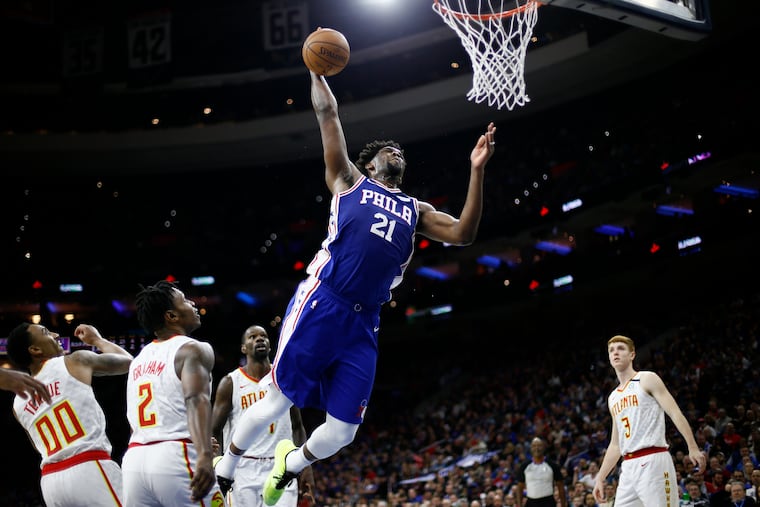Joel Embiid isn’t worth $196 million to the Sixers. Data suggest he’s worth more. | David Murphy
A deep dive inside Joel Embiid's new contract extension and the reasons why the big man is one of the most valuable in the game.

The numbers don’t do Joel Embiid justice.
Sure, that’s a bold claim, especially when you consider the numbers associated with the contract extension the Sixers announced on Tuesday morning: reportedly four years, $196 million, an annual salary schedule that tops out at $54.2 million for the 2025-26 season.
Embiid is worth all of it and more. How much more? That’s the part that’s difficult to say. There might not be a player in the NBA whose value is more difficult to quantify than Embiid. The individual metrics are impressive. Otherworldly, even. But they don’t measure the impact of the double teams he draws on the offensive end, or the shots he deters on the defensive end, or the extent to which both of those things make everyone’s lives easier.
Maybe the best place to start is the oldest metric of them all. Since the start of the 2017 season, the Sixers have won 67.7% of the games in which Embiid has played. Only eight players in the NBA have a better individual won-loss record during that time frame (minimum: 175 games played).
But that alone doesn’t tell us a whole lot. Sure, the list includes guys like Steph Curry, James Harden, Chris Paul, Kevin Durant, Kawhi Leonard, and Giannis Antetokounmpo. But it also includes Serge Ibaka and Ersan Ilyasova, both of whom played alongside two of the aforementioned stars.
The real testament to Embiid’s value lies in his team’s record when he is off the court: 40-40, a split that ranks second only to Curry, whose Warriors are 38-75 without him over the last four years.
Embiid’s plus-minus numbers tell a similar tale. Over the last four seasons, the Sixers have outscored opponents by a combined 1,426 points when Embiid is on the court. That total alone ranks sixth in the NBA, despite the fact that Embiid has played 26 fewer games than the five players who rank above him.
The Sixers center also ranks fifth in plus-minus on a per-48-minute basis since 2017-18, which was Embiid’s first full season. The only players with a better plus-minus than Embiid’s +9.6 are Curry (+10.6), Leonard (+10.6), Antetokounmpo (+10.0), and Durant (+10.0).
But there’s more context to consider: each of those four players have played at least four seasons with another player who ranks in the top 20 in the metric during that span. Curry played two with Klay Thompson (15th) and two with Durant (4th). Leonard played one with Danny Green (9th), two with Paul George (11th), two with Kyle Lowry (16th), and two with Fred VanVleet (20th). Antetokounmpo played two with Brook Lopez (10th) and four with Khris Middleton (13th). Embiid? He’s as singular as it gets, having played one season with Green. Beyond that, the next closest teammates are Jimmy Butler (25th), Robert Covington (41st), and Ben Simmons (46th).
There’s an argument to be made Embiid belongs in that small uppermost tier of impact players in today’s NBA. Curry, Durant, Antetokounmpo, LeBron James, James Harden — that’s the level of impact Embiid has on the court. Everywhere you look, any comparison you make, Embiid ends up among a small handful of all-time greats.
Five years ago, Michael Jordan was the most prolific scorer in NBA history on a per-minute basis, averaging 28.3 points per 36 minutes in his career. Now, Jordan ranks second, because Embiid is in first, with an average of 29.3 points per 36 minutes played.
Most points per 36 minutes, NBA history (minimum 7,000 minutes)
Joel Embiid (29.3)
Michael Jordan (28.3)
George Gervin (28.1)
Kevin Durant (26.5)
James Harden (26.3)
The Embiid extension was as close to a no-brainer as it gets. There are very few players in the NBA that make a team a 50-win franchise all by themselves. Embiid is one of them.
The injury risk will always be there, but NBA contracts are not MLB contracts. Unless a player breaks down in Year 1, a team will always be two or three years away from clearing its books. For Embiid, Year 1 is actually Year 3, since his new extension does not kick in until the 2023-24 season.
But the Sixers have long understood that this would be the cost of doing business. Really, there was no decision to be made. When a player the caliber of Embiid is ready to sign, your one job is to hand him the pen.